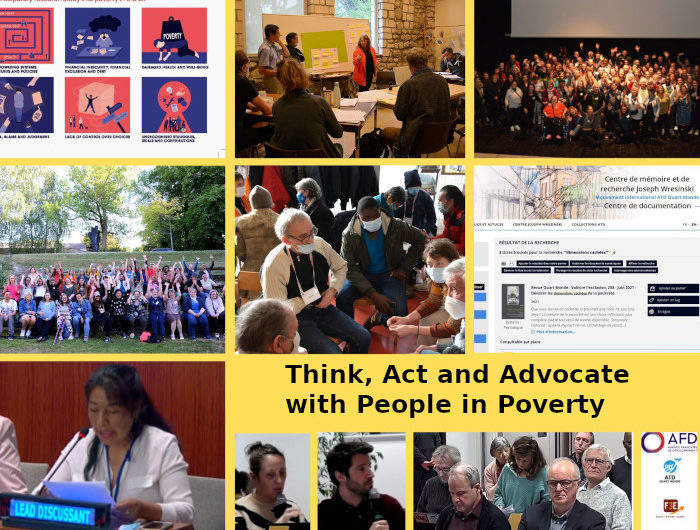Think, Act and Advocate with People in Poverty

In early 2023, independent reviewers Martin Vielajus and Delphine Vincenot from the agency Kayros presented their evaluation of ATD Fourth World’s “Think, Act and Advocate with People in Poverty” project. The event took place at ATD’s headquarters in Montreuil, near Paris.
Main goals and motivation
“Think, Act, Advocate with People in Poverty” represents the third phase of a nine-year series of international projects co-financed by the French Development Agency (AFD). The projects occurred between 2019 and 2022 in Africa, Latin America, the Caribbean, Asia, Europe, and ATD Fourth World’s International Centre in France.
The three main goals of the project were:
- Training and capacity building: Providing members of ATD, many with a lived experience of poverty–as well as other partners–with training and capacity building that enables them to speak in public, to realise the importance of their knowledge and life experiences and to understand the political process and the challenges of the system in which they live. With these tools, members can reinforce their capacity to advocate for themselves and acquire the ability to assist in creating and implementing anti-poverty projects that leave no one behind.
- The promotion of ATD’s research results and archives: The Hidden Dimensions of Poverty, and other research projects using the Merging of Knowledge methodology, highlights the value of participatory research. It considers not only the viewpoints of academics, policymakers and professionals working with people in poverty, but includes those living in persistent poverty as equal partners. The results can provide a tool for developing effective training for those in the social service field, and a framework for researchers and policymakers and those within ATD itself. Promotion of the research involves organising conferences, special events and publishing articles related to the methodology and results of the research projects. ATD’s archives contain over 60 years of documentation representing the suffering, resistance and collective actions of people living in extreme poverty. Through digitalisation and online access of a part of its archives, the goal is to ensure this exceptional collection is more accessible to the general public.
- Advocacy Initiatives: This includes increasing the presence and participation of people with a lived experience of poverty in discussions with public authorities and within international institutions. Calling for institutions both at the European and international levels to increasingly take into account the Hidden Dimensions of Poverty research in policy-making decisions. Additionally, promoting thematic advocacy actions such as education, social protection and decent working conditions within international institutions.
One of ATD Fourth World’s goals is to change ideas and practices related to overcoming poverty. ATD encourages its partners and policymakers to recognise that it is valuable for people with lived experience of poverty to be involved in discussions of poverty and efforts to overcome it. These ideas were central to “Think, Act, Advocate with those in Poverty” projects and their evaluation.
The Evaluation
Martin and Delphine’s yearlong evaluation of these projects highlighted ATD’s methodology and challenges inherent in the activities conducted. In order to understand “Think, Act, and Advocate with those in Poverty”, they reviewed ATD documentation and conducted interviews with members and partners. They also observed trainings and focus groups in Africa and North America.
***
The following is an extract from the final evaluation of the project “Think, Act and Advocate with People in Poverty” (2019-2022) by Martin Vielajus and Delphine Vincenot:
A Difference in Approach
The evaluation found some tension between AFD project requirements and elements of ATD’s culture. This culture allows for local team autonomy regarding project priorities and flexibility in response to the changing rhythms and needs of people in poverty.
However, despite a conflict of styles and approaches, the AFD requirements helped ATD Fourth World focus its global activities on the common goal of building a framework–taking into account the experience and realities of those living in extreme poverty. Developed in partnership with them, this framework can be used by researchers and politicians when making important policy decisions that affect society.
Openness
The evaluators observed that ATD has a strong identity grounded in a history that most members know well. The organisation’s extensive archives record this history in detail and ensures that current activities are well documented. In fact, these records were at the heart of “Think, Act, Advocate with those in Poverty”. Having a solid identity doesn’t mean that ATD withdraws inward. On the contrary, the partners consulted for this report describe a progressive openness of ATD over recent years.
Covid-19
In the middle of “Think, Act, Advocate with Those in Poverty,” the Covid pandemic forced many elements of this project to change. While Covid19 divided and isolated people involved in the projects, ATD adapted its activities effectively to lockdowns and other limits. At the grassroots level, ATD runs projects based on local needs and has close ties to communities in poverty. As a result, it was possible to develop appropriate and useful measures such as solidarity networks. In its advocacy, ATD also implemented new remote event formats, providing internal training and ensuring ATD Fourth World activists had internet connections. This period made it possible to reinforce the participation of members in online events with institutions and to create interesting dynamics in participatory dialogues with activists.

